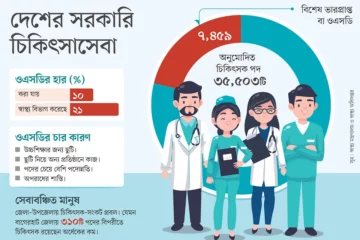Winter has begun. During this time, cold-related diseases are more common among children. Along with this, stomach problems are also common. How to protect children from these diseases is explained by the director of Bangladesh Children's Hospital and Institute and a pediatrician. Professor Dr. Md. Jahangir Alam
* Why do respiratory infections in children increase at the beginning and end of winter?
** In this cold temperature, some bacteria and viruses multiply in the environment. The child's body cannot adjust to this sudden change in temperature, that is, the rise and fall. As a result, some environmental changes occur in the child's body and the germs spread the disease. Due to the increase in dust, the infection of bacteria and viruses that cause respiratory diseases increases at this time. At this time, in addition to sneezing, coughing, cold, sore throat, there is a greater chance of spreading bronchial asthma, pneumonia and bronchiolitis. When cold air enters the nose, the thin membrane here, called the mucous membrane, cools down and the blood vessels contract, resulting in increased infection of viruses and bacteria.
* What should be done immediately if this symptom or disease occurs?
** With cold, cough, cold, sore throat, the child's breathing rate should be monitored. It should also be checked whether the chest is sinking below the ribs. If the breathing rate is more than 60 per minute in children under 2 months, more than 50 in children aged 2-12 months, and more than 40 in children aged 1-5 years, the child can be diagnosed with pneumonia or bronchiolitis. In this situation, it is better not to give home treatment. If the breathing rate is normal and there is a cold and cough, young children should be breastfed, lukewarm water, lemon water, paracetamol for fever, the body should be wiped with a sponge, the child should be kept in a room with light and air circulation in the house and it is better not to take them to crowded places such as markets, any events, bus-train stops. Antihistamines can be taken. If the infection still increases, a doctor should be consulted.
* What kind of anti-allergic and cough syrup can be used in this case?
** There are some cough syrups that are cough suppressants or suppress phlegm. Some are expectorants or expel phlegm, some are used to reduce the intensity of phlegm, and some are sedatives, meaning they reduce phlegm by causing drowsiness.
It can be used for deep, severe cough. However, it is better to use these only after consulting a doctor. If there is a runny nose, then chlorpheniramine maleate, cetirizine are used. Nasal drops are given to clear the nose. It is better to give normal saline drops with lukewarm water to small children. It is better to give antihistamines after examining the child's chest.
* Many children suffer from chronic whooping cough. What can be done in this case?
** This is usually an allergic cough. It is caused by dust and cold allergies and sweating. So, do not sweat and avoid dust and cold. If there is chest spasm or wheezing, then nebulization or inhaler is given. Nebulization is given through a spacer for small children. I advise older children to use an inhaler. However, it is important to find the cause of a long-term cough. This problem can also occur due to respiratory tract infection, bronchiectasis, tuberculosis or if the child's immunity is reduced.
* Why is it recommended that children who suffer from respiratory diseases be vaccinated?
** Vaccination against pneumococcal pneumonia and Haemophilus influenzae has some benefits for children. The influenza vaccine is given every year in November.
* What to do if children have diarrhea or stomach pain in winter?
** Children under 2 years of age suffer from rotavirus diarrhea. Winter diarrhea is also caused by adenovirus or other viruses. Antibiotics are not needed for this. A large amount of saline should be consumed. It is better to give low osmolar orsaline or neosaline to children under 1 year of age. Children over 1 year of age can be fed rice saline. Even if they have diarrhea, children will breastfeed. They can take zinc medication. Folic acid is also given along with it. This diarrhea usually gets better in seven days. If diarrhea lasts more than 7 days, the child is considered to have low immunity.
* When are antibiotics given for respiratory and stomach problems?
** If a cold is accompanied by high fever, increased shortness of breath, and symptoms of pneumonia, and if the sputum thickens and becomes pus-like and changes color to white, then antibiotics are needed. Antibiotics are also needed if fever, shortness of breath, and cough persist for more than three days.
Sudden, watery diarrhea is usually caused by a virus. Stomach upset is also caused by giardiasis and cholera. Cholera is less common in winter. Yersinia enterocolitica also causes stomach upset. Invasive diarrhea, meaning blood and mucus in the stool, severe abdominal pain, and severe twisting, is thought to be a bacterial infection and antibiotics are given.
* How is dengue and Covid infection in children now?
** Covid is now virtually non-existent in Bangladesh. The intensity and transmission of dengue is also on the decline. Since there is no rain in December, the amount of dengue will also decrease. If the child is not able to eat anything, is vomiting a lot, the child suddenly becomes lethargic, blood pressure and pulse pressure are decreasing, if there is severe abdominal pain and bleeding from any part of the body, severe headache, increased heart rate, even if there is convulsion, then hospitalization should be done as soon as possible and dengue fever should be checked. If a child looks normal but his pulse pressure is decreasing, then hospitalization is necessary.
* What can be done to care for baby's skin?
** Before bathing, leave the baby in the sun for a while and apply oil emulsion and then apply lotion. Children whose skin is very sensitive and allergic are given anti-allergic lotion. When the skin becomes dry and itchy, drinking plenty of water, fluids, vegetables and fruits and applying medicated moisturizer are beneficial.
Interviewed by Dr. Fahim Ahmed Rupam





